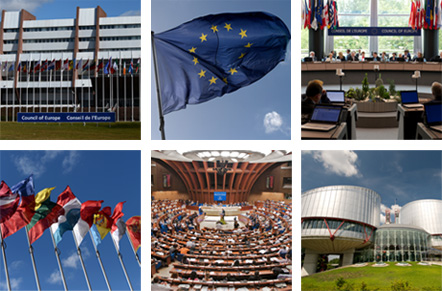Today in Strasbourg, the Council of Europe held a commemorative wreath-laying ceremony in memory of Roma and Sinti victims of the Holocaust. This year marks the 74th anniversary of 2 August, 1944, when all remaining Roma of the so-called “Zigeunerlager” (Gypsy camp) – 2,897 men, women and children – were exterminated in the gas chambers of Auschwitz-Birkenau.
The Romani genocide, later known as Pharrajimos, was the plan by the Nazi regime and those who supported it to exterminate the Romani people of Europe. While exact figures or percentages cannot be ascertained, historians estimate that around 25 per cent of all European Roma were killed, and over 90% in several European countries.
During today’s ceremony there were interventions by Mr Hallvard Gorseth, Head of the Roma and Travellers Team (Directorate General of Democracy) on behalf of the Council of Europe Secretary General, Ms Blaženka Babić, Deputy Permanent Representative of Croatia to the Council of Europe on behalf of the Croatian Chairmanship, Ms Miranda Vuolasranta, President of the European Roma and Travellers Forum (ERTF).
All three speakers stressed the importance of not only acknowledging the past, but also of improving Roma rights today and in the future.
The Croatian Chairmanship of the Council of Europe’s Committee of Ministers recalled the commitments taken within the Thematic Action Plan on the Inclusion of Roma and Travellers (2016-2019). The action plan, adopted by the Committee of Ministers in March 2016, highlights the importance of promoting remembrance and education with regard to the Roma victims of World War II.
Today too many Roma face anti-Gypsyism, discrimination, hate speech and hate crime. Romani children face segregation at school, including tracking into special education. Such segregation, coupled with racist statements creates a climate that fosters hostility and violence. Recent examples include an ethnically motivated killing, as well as forced evictions of Roma in several member states of the Council of Europe.
“The fight against anti-Gypsyism and the need to make Europeans more aware of Roma history in Europe are among the Council of Europe’s political priorities,” concluded Hallvard Gorseth.
On the same day, addressing the ceremony organised in Auschwitz-Birkenau by the German Central Council for Roma and Sinti and the Association of Roma in Poland to commemorate the Roma Holocaust, Dunja Mijatović, the Council of Europe Commissioner for Human Rights, recalled our duty to remember and the crucial importance of combating persisting prejudices and hatred against Roma, in order to stop the perpetuation of human rights violations against them.
In addition to these high-level events, commemoration activities to raise awareness of the Roma genocide for young Europeans, civil society and decision-makers, are taking place from 29 July to 4 August in Krakow and Auschwitz, Poland, organised by the international Roma youth network “ternYpe” and partner organisations supported by the Council of Europe Youth Department.
The Council of Europe is also represented today at the 5th commemoration ceremony at the Arc de Triomphe of Paris in tribute to the nomadic victims of internment in France between 1939 and 1946.
See also:



